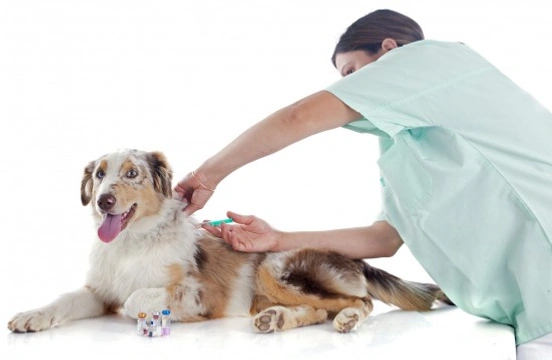
Canine Inoculation
There is some controversy over canine inoculation (similar to those over human vaccination), with a significant proportion of dog owners choosing not to vaccinate for ethical and health reasons. By all means this is a decision that only the owner can make, and in some cases there will be genuine reasons why an individual dog cannot be immunised (e.g. in the event of a past anaphylactic reaction to a vaccine or if a dog is not deemed sufficiently well for inoculation).
There are side effects associated with vaccination in some animals (lethargy, inappetence and gastrointestinal problems being the most common), and some vaccines do have the potential to cause cancerous growths at the site of the injection (although this is primarily associated with cat vaccines that contain a chemical called an “adjuvant” which increases the body’s immune response to an antigen).
Some vaccinations are not very effective. One such example is that for kennel cough because there are so many different strains, just like the human flu inoculation, it’s impossible to cover all of the variants, particularly as they are constantly evolving. Intranasal kennel cough vaccines are also not well tolerated, and it’s not uncommon for a dog to sneeze out most of the content as soon as it’s been administered.
Older animals do build up antibodies and may have sufficient antibodies against the diseases that dogs are normally vaccinated against. Titre testing can be very useful if you are unsure whether to inoculate or not. Over-vaccination however is now less of a risk with the advent of the “three year protocol”. The World Small Animal Veterinary Association (WSAVA) published updated guidelines in 2010 concerning the vaccination of cats and dogs, and has defined core vaccines which they state that all dogs and cats, regardless of circumstances, should receive. The core vaccines for dogs are those that protect against the canine distemper virus (CDV), canine adenovirus (CAV) and canine parvovirus type 2 (CPV-2). The WSAVA does state that: “Vaccines should not be given needlessly. Core vaccines should not be given any more frequently than every three years after the 12 month booster injection following the puppy series, because the duration of immunity (DOI) is many years and may be up to the lifetime of the pet.” Non-core vaccines as defined as “those that are required by only those animals whose geographical location, local environment or lifestyle places them at risk of contracting specific infections.”
However, adverse reactions to vaccines are not as widespread as some people believe, and it is important to look at the positives of canine inoculation as well as the negatives. An independent scientifically peer reviewed study by the Animal Health Trust at Newmarket provided evidence that routine vaccination of dogs in the UK does not increase frequency of illness. Further assurance was given by the Working Group of the government's independent expert “Veterinary Products Committee” who undertook a thorough review of all UK licensed dog and cat vaccines and concluded that: “Vaccination plays a very valuable role in the prevention and control of major infectious diseases in cats and dogs” and that “The overall risk/benefit analysis strongly supports their continued use".
Talk about vaccine safety and frequency with your vet if you have concerns. A good vet will take the time to discuss the subject and all the pros and cons. Some important factors to consider are whether you will ever need to kennel your dog (vaccination is required for admission), and whether you are planning to take your dog abroad (vaccination is required for a Pet Passport).



